Related Research Articles
The denomination 322 BC for this year has been used since the early medieval period, when the Anno Domini calendar era became the prevalent method in Europe for naming years.
Year 309 BC was a year of the pre-Julian Roman calendar. At the time, it was known as the Year of the Dictatorship of Cursor. The denomination 309 BC for this year has been used since the early medieval period, when the Anno Domini calendar era became the prevalent method in Europe for naming years.
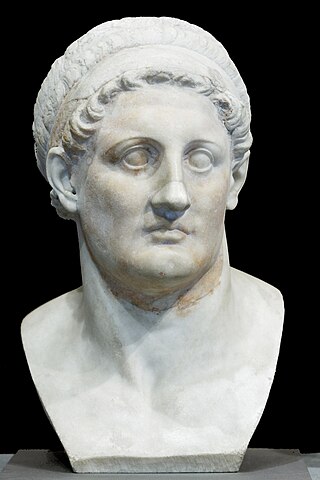
Ptolemy I Soter was a Macedonian Greek general, historian, and successor of Alexander the Great who went on to found the Ptolemaic Kingdom centered on Egypt. Ptolemy was basileus and pharaoh of Ptolemaic Egypt from 305/304 BC to his death in 282 BC, and his descendants continued to rule Egypt until 30 BC. During their rule, Egypt became a thriving bastion of Hellenistic civilization and Alexandria a great seat of Greek culture.
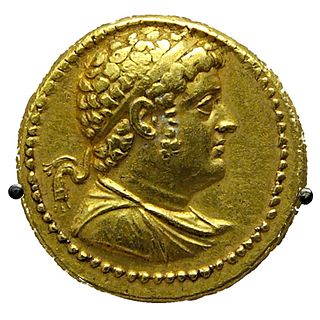
Ptolemy IV Philopator was the fourth pharaoh of Ptolemaic Egypt from 221 to 204 BC.

Leonidas I was king of the Ancient Greek city-state of Sparta. He was the son of king Anaxandridas II and the 17th king of the Agiad dynasty, a Spartan royal house which claimed descent from the mythical demigod Heracles. Leonidas I ascended to the throne in c. 489 BC, succeeding his half-brother king Cleomenes I. He ruled jointly along with king Leotychidas until his death in 480 BC, when he was succeeded by his son, Pleistarchus.
Cleomenes may refer to:
Cleomenes I was Agiad King of Sparta from c. 524 to c. 490 BC. One of the most important Spartan kings, Cleomenes was instrumental in organising the Greek resistance against the Persian Empire of Darius, as well as shaping the geopolitical balance of Classical Greece.

Cleomenes III was one of the two kings of Sparta from 235 to 222 BC. He was a member of the Agiad dynasty and succeeded his father, Leonidas II. He is known for his attempts to reform the Spartan state.

Demaratus was a king of Sparta from around 515 BC to 491 BC. He was the 15th ruler of the Eurypontid dynasty and the firstborn son of King Ariston. During his reign, Demaratus is best known for his opposition to his co-ruler, King Cleomenes I of the Agiad dynasty. This rivalry ultimately led to his dethronement around 491 BC, following Cleomenes' accusations of illegitimacy and political maneuvering.
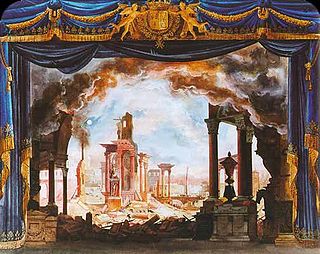
Le siège de Corinthe is an opera in three acts by Gioachino Rossini set to a French libretto by Luigi Balocchi and Alexandre Soumet, which was based on the reworking of some of the music from the composer's 1820 opera for Naples, Maometto II, the libretto of which was written by Cesare della Valle.
Cleomenes II was king of Sparta from 370 to 309 BC. He was the second son of Cleombrotus I, and grandfather of Areus I, who succeeded him. Although he reigned for more than 60 years, his life is completely unknown, apart from a victory at the Pythian Games in 336 BC. Several theories have been suggested by modern historians to explain such inactivity, but none has gained consensus.
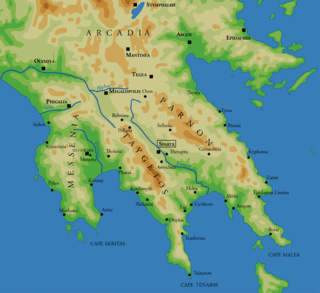
The Battle of Sellasia took place during the summer of 222 BC between Macedon and the Achaean League, led by Antigonus III Doson, and Sparta under the command of King Cleomenes III. The battle was fought at Sellasia on the northern frontier of Laconia and ended in a Macedonian-Achaean victory.
Phylarchus was a Greek historical writer whose works have been lost, but not before having been considerably used by other historians whose works have survived.
Cleomenes, a Greek of Naucratis in Ancient Egypt, was appointed by Alexander III of Macedon as nomarch of the Arabian Nome (νoμoς) of Egypt and receiver of the tributes from all the nomes (districts) of ancient Egypt and the neighbouring part of Africa.
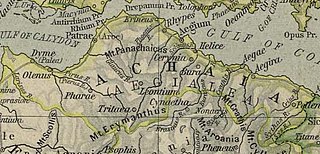
The Battle of Dyme or Dymae was fought by the Achaean League under the command of their Strategos, Hyperbatas, and a Spartan army under the command of King Cleomenes III, and was part of the Cleomenean War. The battle took in place near Dyme in north-west Achaea and was fought in 226 BC.
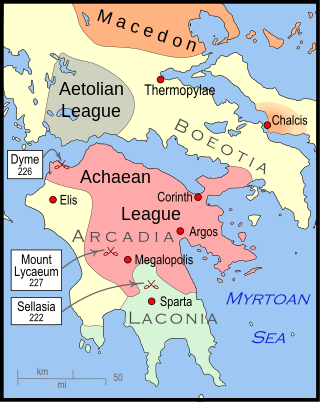
The Cleomenean War was fought between Sparta and the Achaean League for the control of the Peloponnese. Under the leadership of king Cleomenes III, Sparta initially had the upper hand, which forced the Achaean League to call for help the Macedonian king Antigonos Doson, who decisively defeated Cleomenes in the battle of Sellasia in 222.

The Battle of Mount Lycaeum was fought between Sparta led by Cleomenes III and the Achaean League commanded by Aratus. It was the first major battle of the Cleomenean War. The battle occurred at Mount Lycaeum on the border of Elis and Arcadia and ended in a Spartan victory.

Cleombrotus II was a Spartan king of the Agiad dynasty. He married into the royal family via the daughter of Leonidas II, Chilonis. Chilonis's mother was a Persian/Seleucid woman, and Cleombrotus II's wife was therefore not fully Spartan. This created friction between Cleombrotus II's father-in-law and then co-regent Agis IV when it came to succession. Cleombrotus II nevertheless succeeded Leonidas II when the latter fled to avoid trial after clashing with co-regent's reforms, and reigned from 242 BC to 241 BC before Leonidas II returned and once more took the throne. He then sent Cleombrotus II and Chilonis into exile. Cleomenes III, Leonidas II's son, eventually succeeded his father at his death.
Dorieus was a Spartan prince of the Agiad dynasty who is mentioned several times in Herodotus. The second son of Anaxandridas II, he was the younger half-brother of Cleomenes I and the elder full brother of both Leonidas I and Cleombrotus. He tried to found a colony in Cinyps (Libya) but failed. He tried again to establish a colony in western Sicily, but was killed by the Carthaginians.
Lycurgus was a king of Sparta, who reigned from 219 BC until his death shortly before 211 BC. Of obscure background and possibly of non-royal descent, Lycurgus led Sparta in the Social War against Macedon with varying success, and underwent multiple exiles during his checkered reign. He also effectively abolished the traditional Spartan diarchy by dethroning his fellow king Agesipolis III and ruling Sparta as its sole monarch.
References
- Who's Who in the Age of Alexander the Great by Waldemar Heckel ISBN 978-1-4051-1210-9